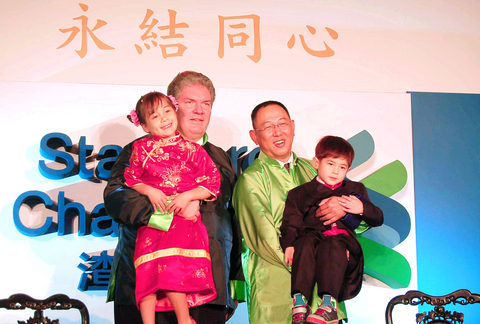Following its acquisition late last year, Hsinchu International Bank (
The name change will be submitted for approval at Hsinchu International's annual general meeting on May 21.
Hsinchu International's incumbent chairman and president Wu Chih-wei (

PHOTO: YANG YA-MIN, TAIPEI TIMES
James McCabe, current chief executive officer (CEO) of Standard Chartered's Taiwan branch, would also retain his title in the merged bank and oversee daily operations, Wu said yesterday at a press briefing.
The new name represents the combination of Hsinchu International's strong regional branch presence with Standard Chartered's international network and financial services to link Taiwanese customers to the rest of the world, Kai Nargolwala, executive director of Standard Chartered group, said in a statement.
The takeover marks the nation's first foreign buyout of a local lender, boosting the British banking group's number of local outlets from three to 86. The move has also driven other international banks in the country, including Citibank, to seek expansion through mergers and acquisitions.
Standard Chartered expects to see rising profitability in the wake of the merger.
"The combination of [the two banks'] business will result in greater profits and broader growth momentum," McCabe said, while declining to elaborate on forecast growth figures.
Standard Chartered incurred a loss of NT$3.3 billion last year in the wake of the consumer credit abuse problem. This compared with profits of NT$1.15 billion in 2005, the Financial Supervisory Commission's data showed.
Hsinchu International posted a huge loss of NT$5.45 billion last year, compared with profits of NT$3.26 billion a year earlier, the commission's data showed.

In Italy’s storied gold-making hubs, jewelers are reworking their designs to trim gold content as they race to blunt the effect of record prices and appeal to shoppers watching their budgets. Gold prices hit a record high on Thursday, surging near US$5,600 an ounce, more than double a year ago as geopolitical concerns and jitters over trade pushed investors toward the safe-haven asset. The rally is putting undue pressure on small artisans as they face mounting demands from customers, including international brands, to produce cheaper items, from signature pieces to wedding rings, according to interviews with four independent jewelers in Italy’s main

Japanese Prime Minister Sanae Takaichi has talked up the benefits of a weaker yen in a campaign speech, adopting a tone at odds with her finance ministry, which has refused to rule out any options to counter excessive foreign exchange volatility. Takaichi later softened her stance, saying she did not have a preference for the yen’s direction. “People say the weak yen is bad right now, but for export industries, it’s a major opportunity,” Takaichi said on Saturday at a rally for Liberal Democratic Party candidate Daishiro Yamagiwa in Kanagawa Prefecture ahead of a snap election on Sunday. “Whether it’s selling food or

CONCERNS: Tech companies investing in AI businesses that purchase their products have raised questions among investors that they are artificially propping up demand Nvidia Corp chief executive officer Jensen Huang (黃仁勳) on Saturday said that the company would be participating in OpenAI’s latest funding round, describing it as potentially “the largest investment we’ve ever made.” “We will invest a great deal of money,” Huang told reporters while visiting Taipei. “I believe in OpenAI. The work that they do is incredible. They’re one of the most consequential companies of our time.” Huang did not say exactly how much Nvidia might contribute, but described the investment as “huge.” “Let Sam announce how much he’s going to raise — it’s for him to decide,” Huang said, referring to OpenAI

The global server market is expected to grow 12.8 percent annually this year, with artificial intelligence (AI) servers projected to account for 16.5 percent, driven by continued investment in AI infrastructure by major cloud service providers (CSPs), market researcher TrendForce Corp (集邦科技) said yesterday. Global AI server shipments this year are expected to increase 28 percent year-on-year to more than 2.7 million units, driven by sustained demand from CSPs and government sovereign cloud projects, TrendForce analyst Frank Kung (龔明德) told the Taipei Times. Demand for GPU-based AI servers, including Nvidia Corp’s GB and Vera Rubin rack systems, is expected to remain high,